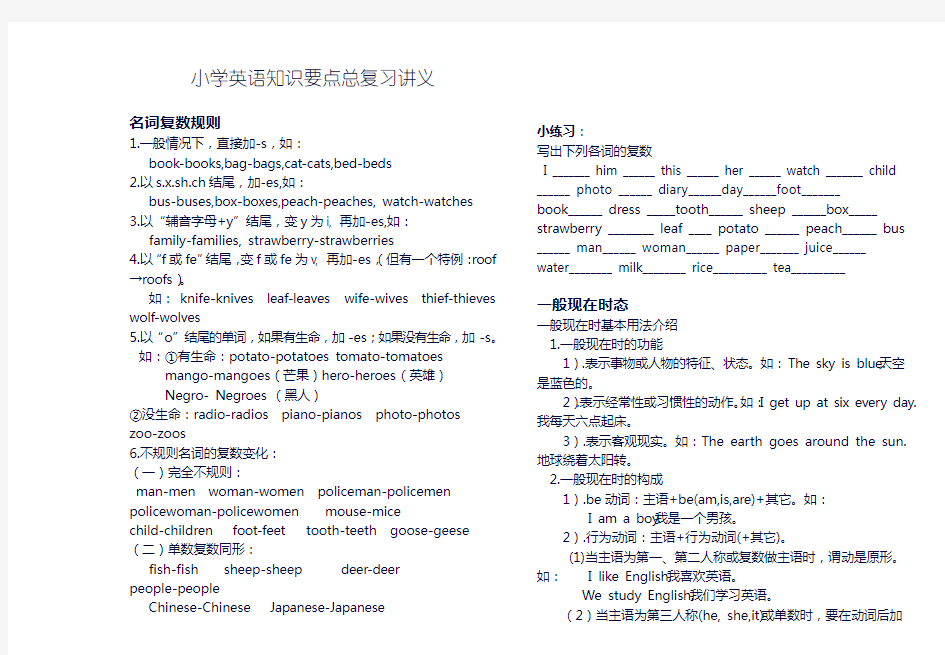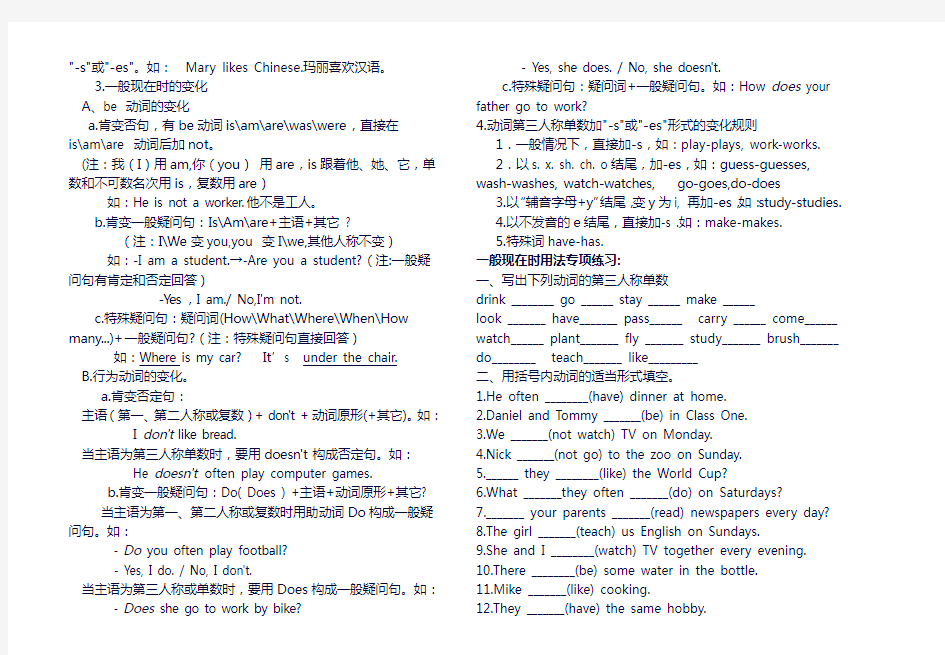最新人教版小学英语知识要点总复习讲义


小学英语知识要点总复习讲义
名词复数规则
1.一般情况下,直接加-s,如:
book-books,bag-bags,cat-cats,bed-beds
2.以s.x.sh.ch结尾,加-es,如:
bus-buses,box-boxes,peach-peaches, watch-watches
3.以“辅音字母+y”结尾,变y为i, 再加-es,如:
family-families, strawberry-strawberries
4.以“f或fe”结尾,变f或fe为v, 再加-es,(但有一个特例:roof →roofs)。
如:knife-knives leaf-leaves wife-wives thief-thieves wolf-wolves
5.以“o”结尾的单词,如果有生命,加-es;如果没有生命,加-s。如:①有生命:potato-potatoes tomato-tomatoes
mango-mangoes(芒果)hero-heroes(英雄)
Negro- Negroes (黑人)
②没生命:radio-radios piano-pianos photo-photos zoo-zoos
6.不规则名词的复数变化:
(一)完全不规则:
man-men woman-women policeman-policemen policewoman-policewomen mouse-mice child-children foot-feet tooth-teeth goose-geese
(二)单数复数同形:
fish-fish sheep-sheep deer-deer
people-people
Chinese-Chinese Japanese-Japanese 小练习:
写出下列各词的复数
I _______ him ______ this ______ her ______ watch _______ child ______ photo ______ diary______day______foot_______
book______ dress _____tooth______ sheep ______box_____ strawberry ________ leaf ____ potato ______ peach______ bus
______ man______ woman______ paper_______ juice______ water________ milk________ rice__________ tea__________
一般现在时态
一般现在时基本用法介绍
1.一般现在时的功能
1).表示事物或人物的特征、状态。如:The sky is blue.天空是蓝色的。
2).表示经常性或习惯性的动作。如:I get up at six every day.我每天六点起床。
3).表示客观现实。如:The earth goes around the sun.地球绕着太阳转。
2.一般现在时的构成
1).be动词:主语+be(am,is,are)+其它。如:
I am a boy.我是一个男孩。
2).行为动词:主语+行为动词(+其它)。
(1)当主语为第一、第二人称或复数做主语时,谓动是原形。如:I like English.我喜欢英语。
We study English.我们学习英语。
(2)当主语为第三人称(he, she,it)或单数时,要在动词后加"-s"或"-es"。如:Mary likes Chinese.玛丽喜欢汉语。
3.一般现在时的变化
A、be 动词的变化
a.肯变否句,有be动词is\am\are\was\were,直接在is\am\are 动词后加not。
(注:我(I)用am,你(you)用are,is跟着他、她、它,单数和不可数名次用is,复数用are)
如:He is not a worker.他不是工人。
b.肯变一般疑问句:Is\Am\are+主语+其它?
(注:I\We变you,you 变I\we,其他人称不变)
如:-I am a student.→-Are you a student?(注:一般疑问句有肯定和否定回答)
-Yes,I am./ No,I'm not.
c.特殊疑问句:疑问词(How\What\Where\When\How many...)+一般疑问句?(注:特殊疑问句直接回答)
如:Where is my car? It’s under the chair.
B.行为动词的变化。
a.肯变否定句:
主语(第一、第二人称或复数)+ don't +动词原形(+其它)。如:
I don't like bread.
当主语为第三人称单数时,要用doesn't构成否定句。如:
He doesn't often play computer games.
b.肯变一般疑问句:Do( Does ) +主语+动词原形+其它?
当主语为第一、第二人称或复数时用助动词Do构成一般疑问句。如:
- Do you often play football?
- Yes, I do. / No, I don't.
当主语为第三人称或单数时,要用Does构成一般疑问句。如:- Does she go to work by bike?
- Yes, she does. / No, she doesn't.
c.特殊疑问句:疑问词+一般疑问句。如:How does your father go to work?
4.动词第三人称单数加"-s"或"-es"形式的变化规则
1.一般情况下,直接加-s,如:play-plays, work-works.
2.以s. x. sh. ch. o结尾,加-es,如:guess-guesses, wash-washes, watch-watches, go-goes,do-does
3.以“辅音字母+y”结尾,变y为i, 再加-es,如:study-studies.
4.以不发音的e结尾,直接加-s .如:make-makes.
5.特殊词have-has.
一般现在时用法专项练习:
一、写出下列动词的第三人称单数
drink ________ go ______ stay ______ make ______
look _______ have_______ pass______ carry ______
come______ watch______ plant_______ fly _______
study_______ brush_______ do________ teach_______
like_________
二、用括号内动词的适当形式填空。
1.He often ________(have) dinner at home.
2.Daniel and Tommy _______(be) in Class One.
3.We _______(not watch) TV on Monday.
4.Nick _______(not go) to the zoo on Sunday.
5.______ they ________(like) the World Cup?
6.What _______they often _______(do) on Saturdays?
7._______ your parents _______(read) newspapers every day?
8.The girl _______(teach) us English on Sundays.
9.She and I ________(watch) TV together every evening.
10.There ________(be) some water in the bottle.
11.Mike _______(like) cooking.
12.They _______(have) the same hobby.
13.My aunt _______(look) after her baby carefully.
14.You always _______(do) your homework well.
15.I _______(be) ill. I’m staying in bed.
16.She _______(go) to school from Monday to Friday.
17.Liu Tao _______(do not) like PE.
18.The child often _______(watch) TV in the evening.
19.Su Hai and Su Yang _______(have) eight lessons this term.
20.-What day _______(be) it today? -It’s Saturday.
三、按照要求改写句子
1.Daniel watches TV every evening.(改为否定句)
___________________________________________________
2.I am a teacher.(改为一般疑问句,并作否定回答)
____________________________________________________ 3.She likes milk.(改为一般疑问句,作肯定回答)
___________________________________________________
4.Amy likes playing computer games.(改为一般疑问句,作否定回答)
___________________________________________________
5.We go to school every morning.(改为否定句)
_______________________________________________________ 6.He speaks English very well.(改为否定句)
___________________________________________________
7.I like taking pictures on the holiday.(对划线部分提问)
_______________________________________________________ 8.John comes from Canada.(对划线部分提问)
___________________________________________________
9.She is always a good student.(改为一般疑问句,作否定回答) _______________________________________________________ 10.Simon and Daniel like going skating.(改为否定句)
___________________________________________________
四、改错(划出错误的地方,将正确的写在横线上)
1. Is your brother speak English?
__________________________________________________
2. Does he likes going fishing?
__________________________________________________
3. He likes play games after class.
__________________________________________________
4. Miss wei teaches us English.
__________________________________________________
5. She don’t do her homework on Sundays.
_________________________________________________
现在进行时态
1.现在进行时表示事情现在正在进行或发生的动作,也可表示当前一段时间内的活动或现阶段正在进行的动作。
2.现在进行时的肯定句基本结构由be+动词ing.
(即is \am\are\was\were+v-ing) 。
3.现在进行时的否定句在be后加not。
(即is \am\are\was\were+not+v-ing)
4.现在进行时的一般疑问句把be动词调到句首.
(即Is \Am\Are\Was\Were +主语+v-ing)
5.现在进行时的特殊疑问的基本结构为:
疑问词(How\What\Where\When\How many...) + be + 主语+
动词ing?
动词加ing的变化规则
1.一般情况下,直接加ing,如:cook-cooking
2.以不发音的e结尾,去e加ing,如:make-making, taste-tasting
3.单音节词以辅元辅结尾,双写末尾的辅音字母,再加ing,如:run-running, stop-stopping
现在进行时专项练习:
一、写出下列动词的现在分词:
play________ run__________ swim _________make__________
go_________ like________ write________ ski___________
read________ have_________ sing ________ dance_________ put_________ see________ buy _________ love____________
live_______ take_________ come ________ get_________
stop_________ sit ________ begin________ shop___________
二、用所给的动词的正确形式填空:
1.The boy __________________ ( draw)a picture now.
2. Listen !Some girls ___________( sing)in the classroom .
3. My mother _________________ ( cook )some nice food now.
4. What _____ you ______ ( do ) now?
5. Look !They _______________( have) an English lesson .
6.They ____________(not ,water) the flowers now.
7.Look! the girls _____________(dance )in the classroom .
8.-What is our mother doing?
She _________(listen ) to music.
9. It’s 5 o’clock now. We _____________(have)supper now
10.______Helen____________(wash )clothes? Yes ,she is .
三、句型转换:
1. They are doing housework .(分别改成一般疑问句和否定句)
_______________________________________________________
_______________________________________________________ 2.The students are cleaning the classroom . ( 改一般疑问句并作肯定和否定回答) _______________________________________________________ _______________________________________________________ 3.I’m playing the football in the playground .(对划线部分进行提问)
_______________________________________________________ 4.Tom is reading books in his study . (对划线部分进行提问)
_______________________________________________________
一般将来时态
一、概念:表示将要发生的动作或存在的状态及打算、计划或准备做某事。句中一般有以下时间状语:tomorrow, next day(week, month, year…),soon, the day after tomorrow(后天)等。
二、基本结构:
①be going to + do;
②will+ do.
三、否定句:在be动词(am, is, are)后加not或情态动词will 后加not成won’t。
例如:I’m going to have a picnic this afternoon.→I’m not going to have a picnic this afternoon.
四、一般疑问句:be或will提到句首,some改为any, and改为or,第一二人称互换。
例如:We are going to take a trip this weekend. →Are you going to take a trip this weekend?
五、对划线部分提问。一般情况,一般将来时的对划线部分有三种情况。
1.问人,用疑问词Who 。例如:I’m going to New York tomorrow. →Who’s going to New York tomorrow?
2.问干什么。用What …do.例如:My father is going to watch TV this afternoon. →What is your father going to do this afternoon?
3.问什么时候。用When.例如:She’s going to go to bed at nine. →When is she going to bed?
六、同义句:be going to = will
I am going to go swimming tomorrow(明天). = I will go swimming tomorrow.
将来时态练习:
填空。
1.我打算明天和朋友去野炊。
I_____ _______ _________ have a picnic with my friends.
I ________ have a picnic with my friends.
2.下个星期一你打算去干嘛? 我想去打篮球。
What ______ _______ _______ _______ ______ next Monday?
I _______ ______ _____ play basketball.
What _________ you do next Monday? I _______ play basketball.
3.你妈妈这个周末去购物吗?是,她要去买一些水果。
_____ your mother _____ ______ go shopping this _______?
Yes, she _________. She ______ ________ __________ buy some fruit.
4.你们打算什么时候去旅行。
When_______ you _________ __________ take a trip?
改句子。
5.Nancy is going to go shopping.(改否定句)
Nancy ________ going to go shopping.
6.I’ll go swimming with them.(改否定句)
I _______ go swimming with them.
7.I’m going to get up at 6:30 tomorrow.(改一般疑问句)
________ _______ ________ to get up at 6:30 tomorrow? 8.We will take a bus to the library.(改一般疑问句)
_______ ________ take a bus to the library?
9.She is going to listen to music after school.(对划线部分提问)
________ _______ she ________ ________ _________ after school?
10.My father and mother are going to do housework tomorrow.(对划线部分提问)
_________ _________ going to do housework tomorrow?
用所给词的适当形式填空。
11.Today is a sunny day.
We ___________________ (have) a picnic this afternoon.
12.My brother _______________ (go) to Shanghai next week.
13.Tom often ______________(go) to school on foot. But today is rainy. He ______________ (go) to school by bike.
14.What do you usually do on weekends? I usually __________ (watch) TV and ____________(watch) insects?
15.It’s Friday today. What _____she _________ (do) this weekend?
She ____________(watch) TV and _____________ (catch) insects.
16.What ___(do) you do last Sunday? I ___(pick) apples on a farm.
What _____you____(do) next Sunday? I _______collect stamps.
17.Mary ____________ (visit) her grandparents tomorrow.
18.Liu Tao ____________ (fly) kites in the playground yesterday.
19.David ______________ (have) a birthday party next Monday.
20.I ________________ (plan) for my study now.
一般过去时态
1.一般过去时表示过去发生的动作或存在的状态,常和表示过去的时间状语连用。如:yesterday,last weekend \Monday\year...,the day before yesterday等
2.Be动词在一般过去时中的变化:
⑴am 和is在一般过去时中变为was。(was not=wasn’t)
⑵are在一般过去时中变为were。(were not=weren’t)
⑶带有was或were的句子,其否定、疑问的变化和is, am, are 一样,即否定句在was或were后加not,一般疑问句把was或were调到句首。
3.句中没有be动词的一般过去时的句子
否定句:didn’t +动词原形,如:Jim didn’t go home yesterday.
一般疑问句:在句首加did,句子中的动词过去式变回原形。如:Did Jim go home yesterday?
特殊疑问句:
⑴疑问词+did+主语+动词原形?
如:What did Jim do yesterday?
⑵疑问词当主语时:疑问词+动词过去式?
如:Who went home yesterday?
动词过去式变化规则:
1.一般在动词末尾加-ed,如:work-worked, clean-cleaned 2.以不发音e结尾,直接加d,如:taste-tasted
3.末尾只有一个元音字母和一个辅音字母的重读闭音节,应双写末尾的辅音字母,再加-ed,如:stop-stopped
4.以“辅音字母+y”结尾的,变y为i,再加-ed,如:study-studied 5.不规则动词过去式:(需自己记忆)
am,is-was, are-were, do-did, see-saw, say-said, give-gave,
get-got, go-went, come-came,have/has-had, eat-ate, take-took, run-ran, sing-sang, put-put, make-made, read-read, write-wrote, draw-drew, drink-drank, fly-flew, ride-rode, speak-spoke,
sweep-swept, swim-swam, can-could,shall-should,bring-brought, lose-lost,sleep-slept,find-found,hurt-hurt,keep-kept,leave-left, send-sent,cut-cut,drive-drove,fall-fell,sell-sold,stand-stood,
think-thought, sit-sat,let-let,write-wrote,teach-taught,tell-told,
一般过去时练习
写出下列动词的过去式
is\am_________ fly_______ plant________ are ________
drink_________ play_______ go________ make ________
does_________ dance________ worry________ ask _____
taste_________ eat__________ draw________ put ______
throw________ kick_________ pass_______ do ________
think_________
Be动词的过去时练习(1)
一、用动词的适当形式填空
1.I _______ (go)to school yesterday.
2.He ________ (study) English last weekend.
3.Amy and Luce ________ students two years ago.
4.We (eat)many oranges just now.
5.Yang Ling ________ eleven years old last year.
6.There ________ an apple on the plate yesterday.
7.There ________ some milk in the fridge last Sunday.
8.The phone _______ on the sofa yesterday evening.
二、句型转换
1. It was exciting.
否定句:________________________________________________ 一般疑问句:____________________________________________
肯、否定回答:__________________________________________ 2. All the students were very excited.
否定句:________________________________________________ 一般疑问句:____________________________________________ 肯、否定回答:__________________________________________ 3. They were in the woods.
否定句:________________________________________________ 一般疑问句:____________________________________________ 肯、否定回答:__________________________________________
形容词比较级
一、形容词的比较级
1、形容词比较级在句子中的运用:两个或两者以上事物或人的比较用比较级,比较级后面一般带有单词than。比较级前面可以用more, a little 来修饰表示程度。than后的人称代词用主格(口语中可用宾格)。(形容词比较级+than)
2.形容词比较级的规则:
⑴一般在词尾加er ;
⑵以不发音字母e 结尾,加r ;
⑶以一个元音字母和一个辅音字母结尾,应双写末尾的辅音字母,再加er ;
⑷以“辅音字母+y”结尾,先把y变i,再加er 。
3.不规则形容词比较级:
good-better, beautiful-more beautiful
形容词比较级练习:
(一)、写出下列形容词的比较级
old__________ young________ tall_______ long________
short________ strong________big________small_______ fat_________ thin__________ heavy______funny________ early_________good_________ beautiful_________________
(二)、根据句意填入单词的正确形式:
1. My brother is two years __________(old)than me.
2. Tom is ________(fat) than Jim.
3. Is your sister __________(young) than you? Yes,she is.
4. Who is ___________(thin),you or Helen? Helen is.
5. Whose pencil-box is _______(big),yours or hers?
6. Mary’s hair is __________(long) than Lucy’s.
7.My eyes are __________(big) than ________ (she).
人称代词与物主代词
一、人称代词
人称
单数复数
主格宾格主格宾格第一人称I me we us
第二人称you you you you 第三人称
he him
they them
she her
it it 二、物主代词
数人称类别
单数复数
第一
人称
第二
人称
第三
人称
第一
人称
第二
人称
第三
人称
形容
词性
物主
代词
my your his her its our your their 名词
性物主代词mine yours his
her
s
its
o u r
s
yours theirs
汉语我的你的他
的
她
的
它
的
我
们
的
你们
的
他
(她、
它)们
的
用所给词的适当形式填空
1.The yellow picture is____(my).
2.The dog is _______(Mike)
3.–Whose book is it ?-It’s _______(he).
4.Look!This is my computer,That is ______(you).
5._____(she)name is Amy.
6.These books are_____(they),and those are______(you)
7.Your feet are bigger than______(my)
8.Are these______(we)?
9_____(it) name is Meimei.
10._______(they) tails are longer then the rabbits’.
完全,缩略形式
I'm=I am he's=he is she's=she is they're=they are you're=you are there's=there is they're=they are can't=can not don't=do not doesn't=does not isn't=is not aren't=are not let's=let us won't=will not I'll=I will wasn't=was not
学生易错知识
1. a, an的选择: 单词发音为元音字母开头的单词用an,辅音字母开头的单词用a.
2. am , is , are的选择: 单数用is , 复数用are;I 用am ;you 用are;
is跟着he\she\it.
3. have , has 的选择: 表示某人有某物.单数用has , 复数用have;
I ,you 用have ;he\she\it用has.
4. there is, there are 的选择:表示某地有某物,某人.单数用there is , 复
数用there are.
5. some, any 的选择:肯定句用some, 疑问句和否定句用any.
6.疑问词的选择:what (什么) who (谁) where (哪里) whose (谁的) why(为什么)when(什么时候)which(哪一个)how old (多大) how many (多少)how much(多少钱)
